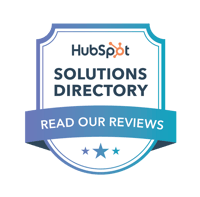For us marketers, it's so easy to get bogged down in terminology that we forget that not everyone just automatically knows what marketing terms mean.
So today we'll help you sound impressive to your boss by wowing them with some impressive marketing knowledge.
We'll be covering a basic marketing strategy: segmentation and targeting.
What is Segmentation?
You do a lot of business with a lot of people, including customers, sales leads, vendors, suppliers, partners, etc. That translates into a lot of email addresses and phone numbers to keep tabs on.
Segmentation is the process of dividing up your contacts into smaller lists based on shared attributes. This could be as simple as segmenting by location - maybe you put everyone who is in Minnesota in one list, and non-Minnesota contacts on another list.
The most common place to start is segmenting by lifecycle stage - aka, where they are in the sales process. The standard looks like one list for sales leads, one for current customers, one for lost leads, and another for non-clients (suppliers, partners, etc.).
What is Targeting?
Now comes next step after segmentation. Targeting is the process of sending marketing materials to only certain segmented lists. Let's say that you're running a promotion for any Minnesota residents. If you segmented your lists to separate out Minnesota residents, you would send an email about the promotion only to those residents.
While you can use segmentation and targeting in multiple facets of marketing, the most common use is in email. That's because it's easiest to control who sees content via email since you are in charge of deciding exactly who an email is sent to.
However, some social media platforms allow you to segment your posts and you can also segment by hiding content behind a login screen.
Why Segment and Target?
The simple answer is because you're more likely to get engagement and leads when content is dialed-in to the exact audience. If you constantly blast out all offers to all audiences, you're more likely to get people tune out over time.
For example: If I rent, why would I pay attention to a company that's constantly emailing me home ownership tips? Even if I use them for current services, I'm likely to unsubscribe from their emails altogether because they have no relevance to me.
Targeted marketing materials also allow you to get a lot more specific and really narrow in on a message and call to action.
How to Get Started with Segmentation and Targeting
When you're starting with segmentation, a great place to start is with the 5ws and 1h:who, what, where, when, why and how. These will give you natural categories for your audience that you can use to segment.
If you're new to segmentation and targeting, here are a few ideas as a jumping-off point:
- Segment by birthday and a happy birthday email with a special offer (ex: 20% off birthday coupon good during their birthday month)
- Segment by service and send an email with relevant news/tips for that service (ex: A plumber sending business owners emails with information about commercial plumbing)
- Segment by location and send location-based notices (ex: Sending an email to clients who use X location a notice of an upcoming loyalty event at that location only)
Segmentation and targeting is an important marketing tactic that any business can use. No matter your marketing expertise, you can use this tactic to better connect with your audience and get higher quality leads.
Free Guide: Beginner's Guide to Digital Marketing
This in-depth covers everything you need to know to get started with effective digital marketing
What exactly digital marketing is and how it works.
Explore a step-by-step process for running an digital marketing campaign in today’s competitive business landscape.
Best practices for your digital marketing strategy
We walk through how to implement a strategy using digital marketing, email, SEO, social media and online advertising.
How to measure the impact and ROI of your strategy
Make insights-driven business decisions and confidently present the value and impact of marketing efforts in support of top-level business objectives.
BizzyWeb is a Minneapolis-based digital marketing and web design agency that helps companies get the high-quality leads they need to grow and thrive. Our tactics include inbound marketing, SEO, advertising, web design, content creation and sales automation. We are an accredited HubSpot Platinum Partner and we offer full-service HubSpot onboarding, enablement and strategy for new and current users.






